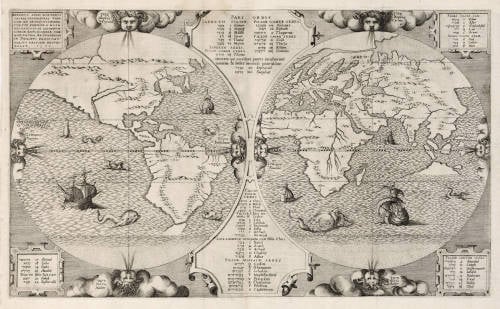Leen Helmink Antique Maps
Old books, maps and prints by Benedictus Arias Montanus
Benedictus Arias Montanus (1527-1598)
Benito Arias Montano was a Spanish priest and Orientalist; born in 1527 at Freseenal, Estremadura; died 1598 at Seville. Philip II entrusted him with the editing of the Polyglot Bible which was printed in Antwerp (1568-1572) under the title "Biblia Sacra, Hebraice, Chaldaice, Græce, et Latine, Philippi II., Regis Catholici Pietate et Studio ad Sacrosanctæ Ecclesiæ Usum Chph. Plantinus Excudebat."
Arias was accused of Judaizing, on account of his insertion in the Polyglot of certain Aramaic paraphrases tending to confirm the Jews in their claims; but he was acquitted of the charge through a favorable report on the matter by the inquisitor, P. Mariana (1580). He translated Benjamin of Tudela's "Masa'ot" into Latin (1575, 1636, 1764), and was the author of "Antiquitatum Judaicarum" (published, with engravings, in Leyden, 1593), and many other works.
(Gottheil and Porter)
Arias Montanus (Benedictus)
A Spanish priest and Orientalist, born in Estremadura (in a mountainous district, whence the name Montanus) in 1527, of noble but poor parents. He distinguished himself early by his acquaintance with the Oriental languages, and was ordained priest in the order of St. James, of which he had become a clerk.
The bishop of Segovia took him with him to the Council of Trent, after which Arias retired to the monastery of Our Lady "de los Angelos," in the mountains of Andalusia, whence, however, he was recalled by King Philip II, to labor at the new Polyglot Bible, which he was causing to be made after that of Alcala, at the suggestion of the celebrated printer Plantin. This Bible was printed at Antwerp, in 1571, under the title Biblia Sacra, Hebraice, Chaldaice, Greece, et Latine, Philippi II, Regis Catholici Pietate et Studio ad SacrosancteB Ecclesice Usum Ch h. Plantinus excudebat (8 vols. fol.).
The "Polyglot" in every respect justified the high expectation which had been formed of it; but in a voyage from the Netherlands to Spain nearly all the copies were lost. The king remunerated Arias's labors by giving him a yearly pension of 2000 ducats, besides other honorary rewards and lucrative offices. Arias was an upright, sincerely orthodox Romanist, but he was a declared enemy of the Jesuits, and that ambitious order omitted no opportunity to take revenge on so dangerous a foe — the more powerful because his orthodoxy had never been questioned, and was supported by uncommon erudition. He was accused of Judaism because he had inserted in the Polyglot certain Chaldee paraphrases, which tended to confirm the Jews in their errors. He made many voyages to Rome to justify himself, and in 1580 was honorably dismissed, and died at Seville in 1598, prior of the convent of St. Jago.
Arias's numerous and extensive literary works chiefly belong to theological, but partly also to classical literature, but his Polyglot certainly holds — the principal place; it is generally called the "Antwerp Polyglot," or, from the patronage bestowed on it by Philip II, "Biblia Regia," and sometimes also, after the printer, "Biblia Plantiniana."
(McClintock)

